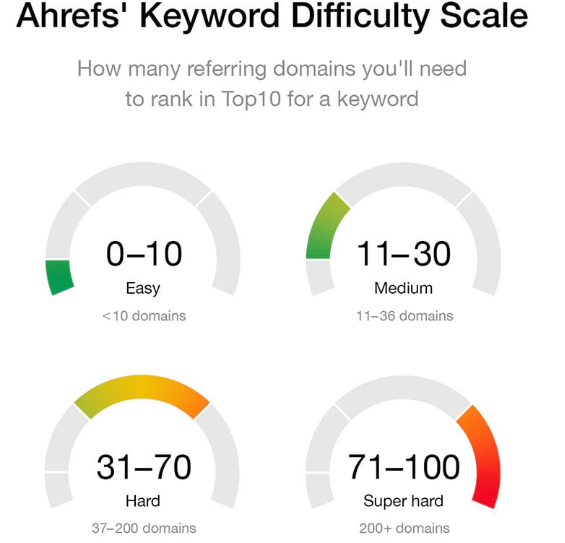Introduction
Keywords are the backbones of SEO. Hence, keyword research is the fundamental pillar to SEO. You, as a marketer have to know what millions of people are searching for every day on search engines like Google. If your blog articles are not based on what searchers are searching for then do not expect any Traffic to your website from Google.

Fundamental of Keyword research
If you are a seasoned marketer in the field of SEO then this very basic will freshen up your prior knowledge. If you are a start-up in SEO then these next few paragraphs will provide you with basic insights on Keyword Research.
If you are having questions like what is keyword research and why it is still so important then please go through the next sections.
What is keyword research?
Keyword research is a form of digital marketing that involves researching and analyzing search terms used by potential customers.
It is used to identify the most commonly searched keywords related to a company’s product or service, and to determine how they compare to those of their competitors. By understanding the keywords used by potential customers, businesses can optimize their website content, ad campaigns, and other digital marketing strategies to ensure they are targeting the right audience.
Furthermore, keyword research can help businesses identify opportunities to create new content or products that are specifically tailored to the needs of their potential customers.
Why is keyword research important?
By utilizing keyword research, businesses can ensure their website content is properly targeted to the right customers and that those customers can find their website quickly and easily. Additionally, keyword research can help businesses identify new opportunities for content, ensuring their campaigns remain up-to-date and relevant.
Simply putting it this way – keyword research is an essential component of any digital marketing strategy.
- Insight to Marketing Trend: keyword research helps businesses to identify potential new opportunities and market trends in their industry, which can be used to create effective content and digital marketing campaigns. It can help businesses identify opportunities for creating content that will draw potential customers in, and help them keep up with the latest trends in the market.
- Helps in Traffic Growth: By optimizing their websites for certain keywords and phrases, businesses can make sure that their websites appear higher in search engine results pages. This helps them to attract more visitors and generate more leads.
- Helps in Acquisition of Customer: Keyword Research helps marketers to reach a wider audience and to improve their website’s visibility on the internet. This helps in attracting the right kind of website visitors and converting them into customers.
- Article Topic: keyword research can help businesses understand the needs and wants of their target audience, allowing them to create more targeted content that will better resonate with them.
How to discover keyword ideas?
The process of keyword research starts you imagining being your own customer. What are the possible key phrases, or words your customers are inserting into the search engines? In simple words, what are the solutions to the problems they are looking for?
You have to have a good knowledge of your own business sector. A very handy tool that might help you with this is a Keyword Research tool like Ahref’s Keyword Research tool, Ubersuggest, MOZ, etc.
Discovering SEED keywords
Seed keywords are the words and phrases used to identify the primary topics related to a business’s product or service. They are the foundation upon which a keyword research strategy is built and can be used to find related, long-tail keywords to incorporate into ad campaigns and website content.
Seed keywords go beyond simply identifying the topics of interest; they are also used to gain insights into the customer’s needs, values, and preferences. Once identified, businesses can then use these insights to refine their marketing strategies and create content that more effectively resonates with potential customers.
For example, if you are into a travelling business then your seed keyword could be:
- Travel
- Trip
- Tour
- Holiday
- Places to visit
- Things to do in
Find out Keywords by competitors and what they are ranking for
Once your business has identified your seed keywords, you can then research what keywords your competitors use and rank for. This is an important part of keyword research and can help your businesses to gain insights into what customers are searching for and what products or services they are looking for.
By understanding the keywords that your competitors are targeting, your businesses can more effectively position themselves to compete in the market and reach potential customers. Furthermore, it enables businesses to find and capitalize on opportunities that their competitors may have overlooked.
You can type your seed keyword in Google search and see what comes up. The sites which are ranking on the first search engine result page (SERP) are your competitors. Well many of them could be strong contenders to compete with, so you need to dig deeper and go for more specific things.
For example, if you are selling trekking gear then you could search more specific keywords like “trekking poles” rather than searching for “Travel”.
Once you have listed down your relevant competitors then you could use a more scientific tool like Ubersuggest to find out which keywords they are targeting and which keywords are attracting more traffic to their website and how much traffic they are having per keyword.
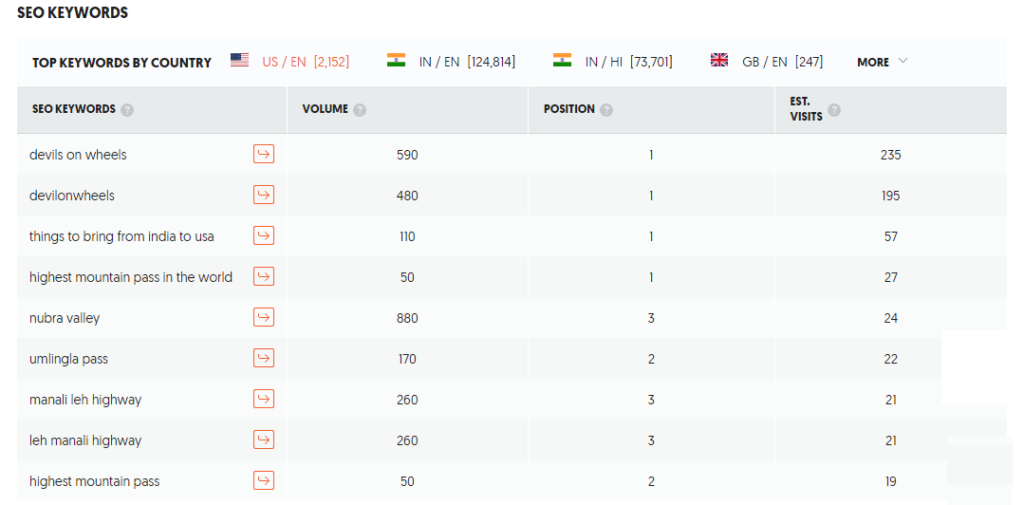
Once you have checked all your competitors with the tool you will find a long list of relevant keywords. However, we need to detect what is the searcher’s intent behind these discovered keywords.
We will later in the article understand the searcher’s intent of a keyword.
Use keyword research tools
You can use Google Keyword Planner (GKP) which is free to start with. You can insert your seed keyword in GKP and get relevant keyword ideas.
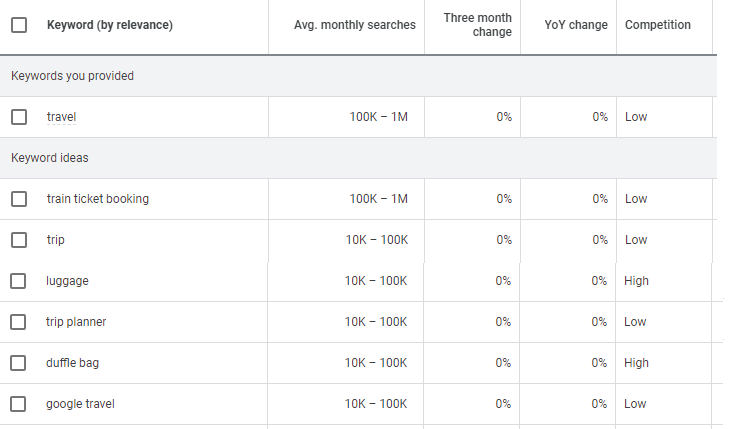
The above keyword ideas were provided to me when I inserted the seed keyword “Travel” into GKP. Now you might ask where is the word Travel in the keyword “luggage”. GKP pulls out all the keyword which is related to the seed keyword like the one in the above example. That is GKP is so powerful.
However, GKP has its own limitations. For more intricate data for these keywords, use tools like Ubersuggest, Ahref’s Keyword Research Tool. MOZ etc.
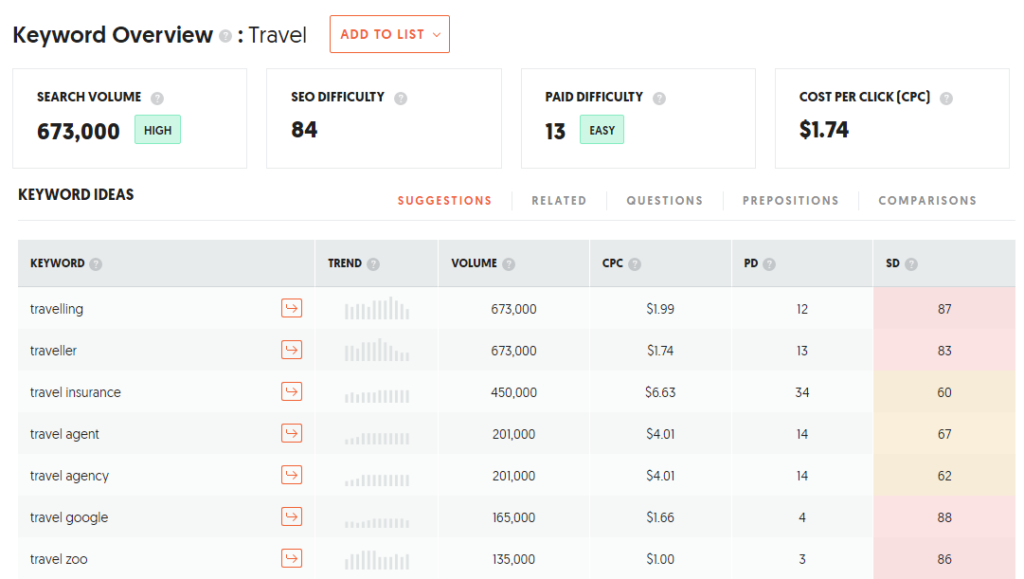
Let us insert the seed keyword “Travel” into Ubersuggest and see what comes up. The above data gives you a keyword overview of the seed keyword with more specific information about it like Search Volume, SEO difficulty, Paid Difficulty, CPC (Cost Per Click), etc. This we have not seen in GKP.
Explore your Niche
Though the previous step will provide you with enough Keywords to start with it is still recommended explore other areas and platforms for having a deeper understanding of your niche.
Areas could be Wikipedia, Google Auto Suggest, Google-related searches at the bottom of the SERP, Google Youtube auto suggest, Reddit, Other Search Engines like Bing, niche-related forums, Google Trends, Google’s People also ask, Social media, etc.
This will give you a wide variety of ideas about your niche and even will help you to pick a micro niche for targeting specific customers.
Explore seasonal keywords
There are keywords that you can target in specific seasons and events in a year. For example, if you are in the Travelling industry and are trying to sell winter accessories and apparel related to travel then you can search seasonal keywords from Google Auto Suggest.
If I type “Travel Winter Apparel” in Google Search then this comes up.
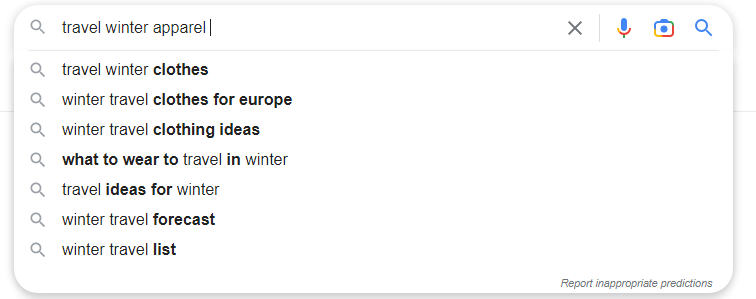
Google even suggests more specific long-tail keywords (this will be explained later in the article) like “What to wear to travel in winter”. Amazing isn’t it?
You can also go deeper into Google-related searches. Please check below the data that I have found with the above keyword in Google.
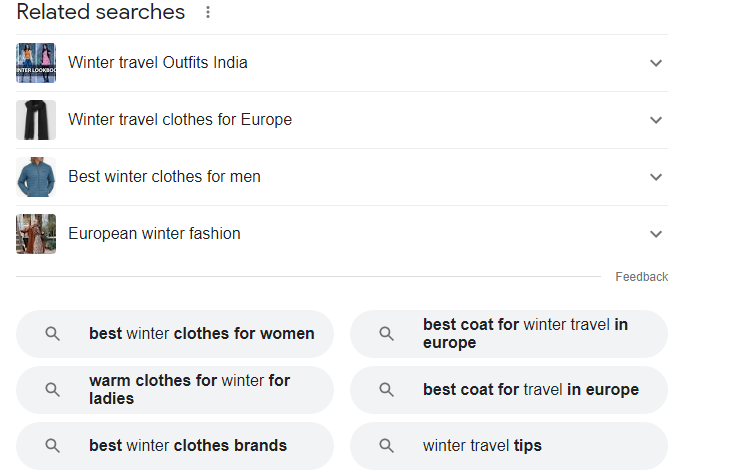
Explore Keywords by location
You can search keywords by location or specific region. For example, if I type “Travel winter” in Google then check out what the “People also ask” section has for you.
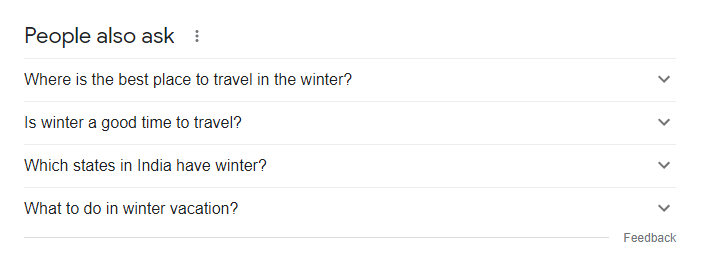
Apart from SERP and other search results Google also provides you with the kind of questions and queries that are trending.
How to analyze keywords
You will be getting millions of keywords following the above methods but the question is which one will give you success and makes you stand apart from your competitors.
You need to use a few SEO metrics on a Keyword Analytical Tool to narrow them down and make a list that you can work with.
Let us go through each one by one.
For example, if I type a seed keyword Travel in Ubersuggest Keyword Research Tool then below is the result.

Discovering search volume
These metrics give you an idea about the number of searches a particular keyword has in a month. For example, in our case, the keyword Travel gets a monthly search volume of 673,000.
You must remember a few things about this metric.
- It does not give you the exact number of people who search for this keyword. It is an exact figure of the number of searches.
- If you manage to Rank on the first page of Google then do not expect to get the exact number of traffic for this keyword to your website.
- It is an annual average calculated by dividing the entire traffic in a year by 12 months.
- It is always region specific.
Traffic Potential
If you check the Keyword overview of “Travel” in Ubersuggest and then click on the search results of a particular keyword then you will find what the traffic the top ranking pages are receiving is. This gives you an idea of the Traffic Potentiality of the said keyword.
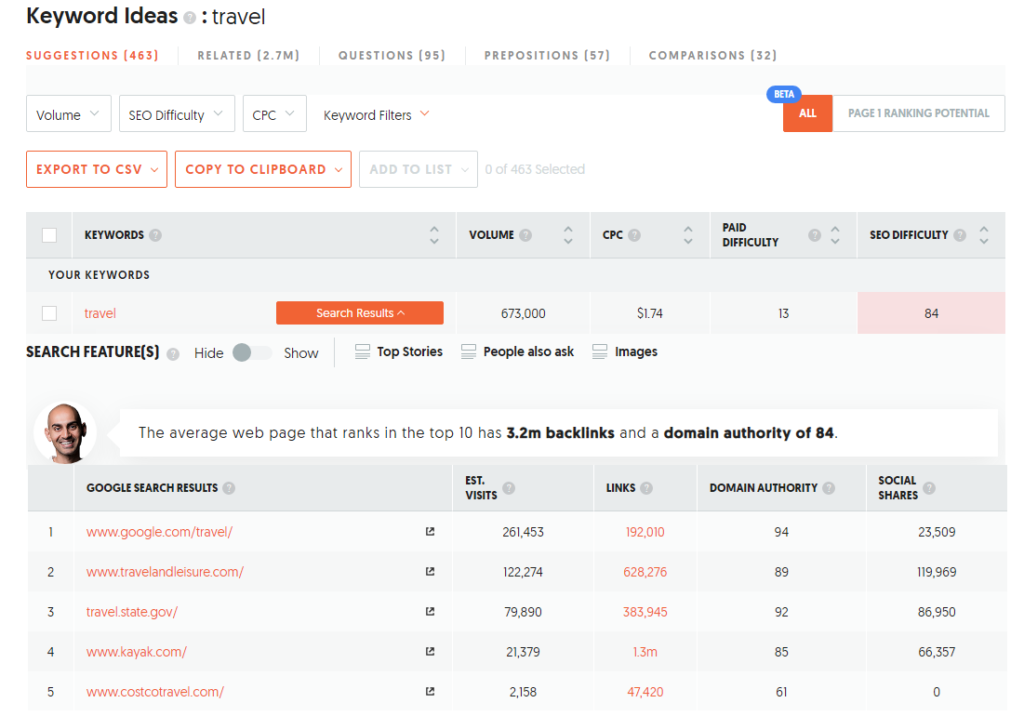
So here in the above example, the estimated monthly visit gives you an idea about the traffic potential of the keyword “Travel”
SEO Keyword Difficulty
This metric gives you an idea of how difficult it is to rank for a keyword in the search engine. It is expressed as a number from 0-100. More the number more the difficulty to rank. You have to face a huge competition to rank for a higher number.
There are a few factors based on which marketers judge the difficulty of ranking for a keyword. Ahref has wonderfully laid down the judging factors to be Search intent, Content depth, relevance, freshness, authority, Number (and quality) of backlinks, Domain Rating, SERP features, etc.
There is a correlation between Keyword difficulty and the number of backlinks that you need to have for ranking. Below is the AHREFS’ Keyword Difficulty Scale.
Cost Per Click (CPC)
This shows the average cost per click that any advertiser is willing to pay to Google to be seen as an Ad. This is an indication that the higher the CPC, the more that valuable keyword is.
For example the example keyword “Travel” of $1.74. This shows advertisers are willing to pay $1.74 per click for this keyword and it also shows that few people are searching this keyword with buying intention.
It should be noted that Search volume and CPC changes over time and they are quite volatile. CPC is more volatile than Search volume as Search Volume remains pretty consistent for a few months.
How to target keywords
Targeting keywords starts with analyzing the subject of the article. Identify the kind of page you want to create that will rank for a particular keyword. You can select a keyword or multiple keywords that will increase the chance of reaching your target audience and ultimately, ranking higher.
How to target relevant keywords? Let’s straight dive deeper into it.
Identifying and targeting Parent Topic
For example, we try to analyze a seed keyword camping in the Ubersuggest tool and have made a list of a few keywords that we want to go ahead with. We are targeting keywords with low SEO Keyword Difficulty from 0-35.
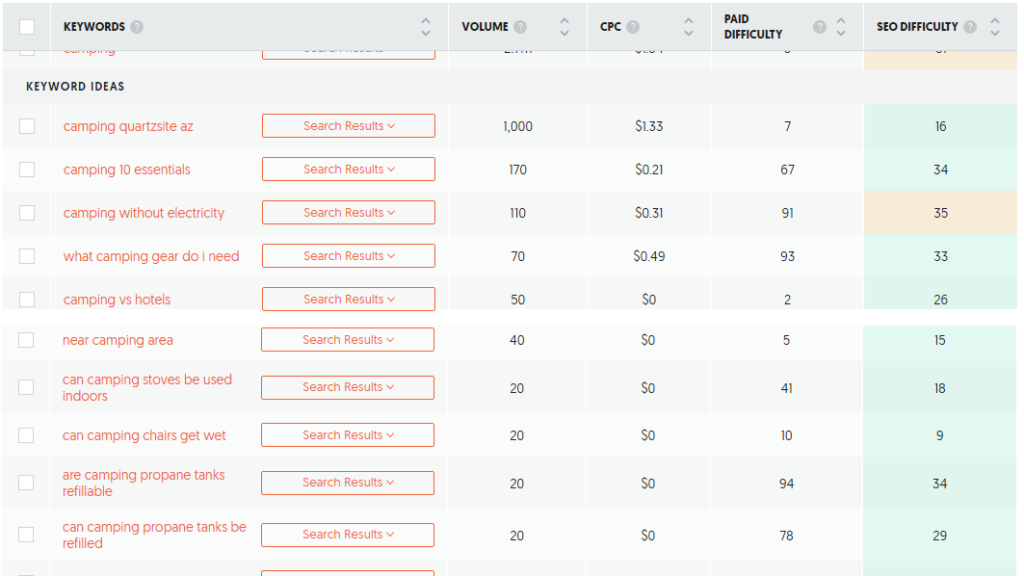
Obviously, we will go with those that have non-zero CPC and have more than 10 search volumes per month.
Now we have to decide on whether we should write a separate page per keyword or should we write an article based on related multiple keywords. It depends on a further study on how Google treats each keyword. Does Google consider the keywords a part of the same topic or different?
For example, in our list, we have two such keywords. “camping essentials” and “what camping gear do I need”.
For the first keyword below is the snapshot of Google SERP
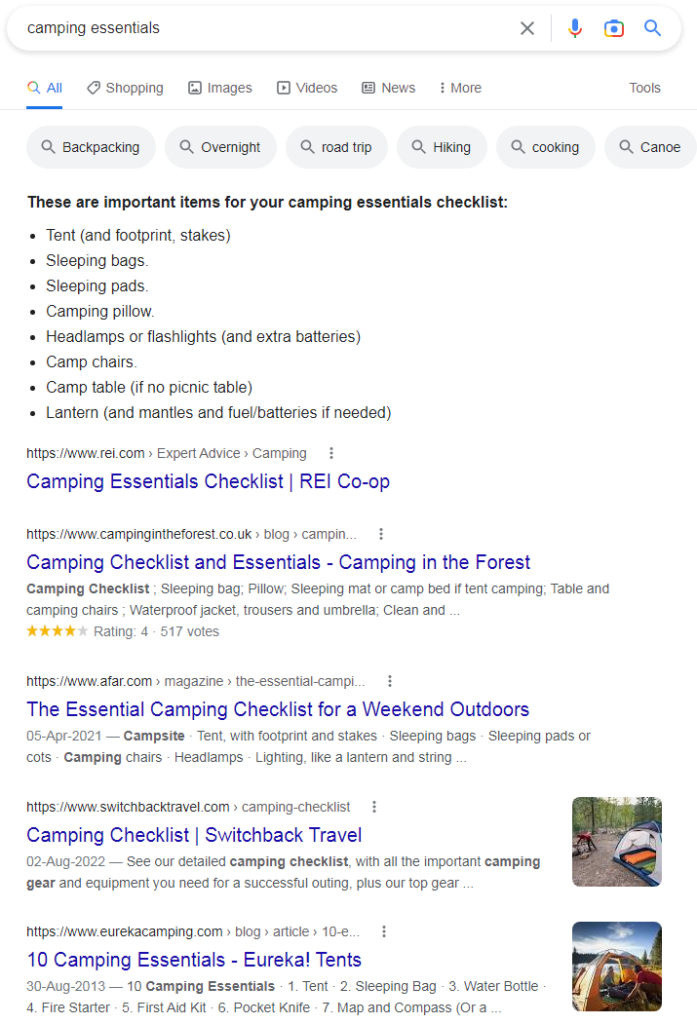
For the second keyword below is the snapshot of Google SERP
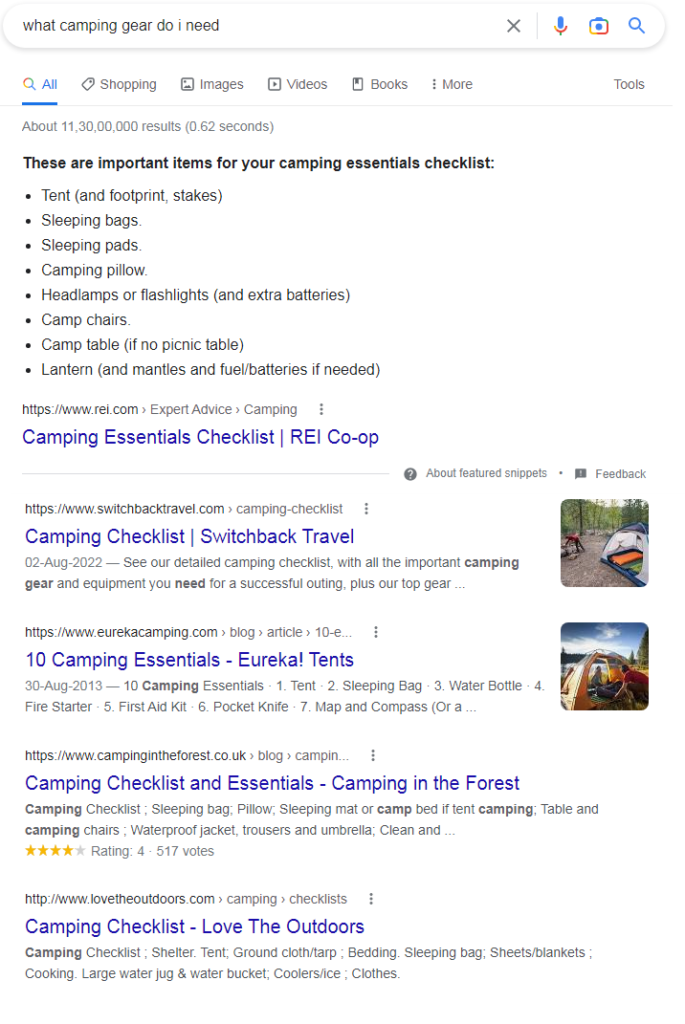
You can very well compare the 2 SERPs and come to the conclusion the top-ranking pages in the search result are nearly identical. So Google considers “camping essentials” as a general query and considers “what camping gear do I need” as a more specific query.
So, writing a separate article on these two similar keywords would not be such a good idea.
Now if we consider another keyword “camping chairs” which is a camping essential but not treated as same as “camping essentials” by Google. Check the SERP below. The results below are all different from the above two. These are all E-Commerce sites.
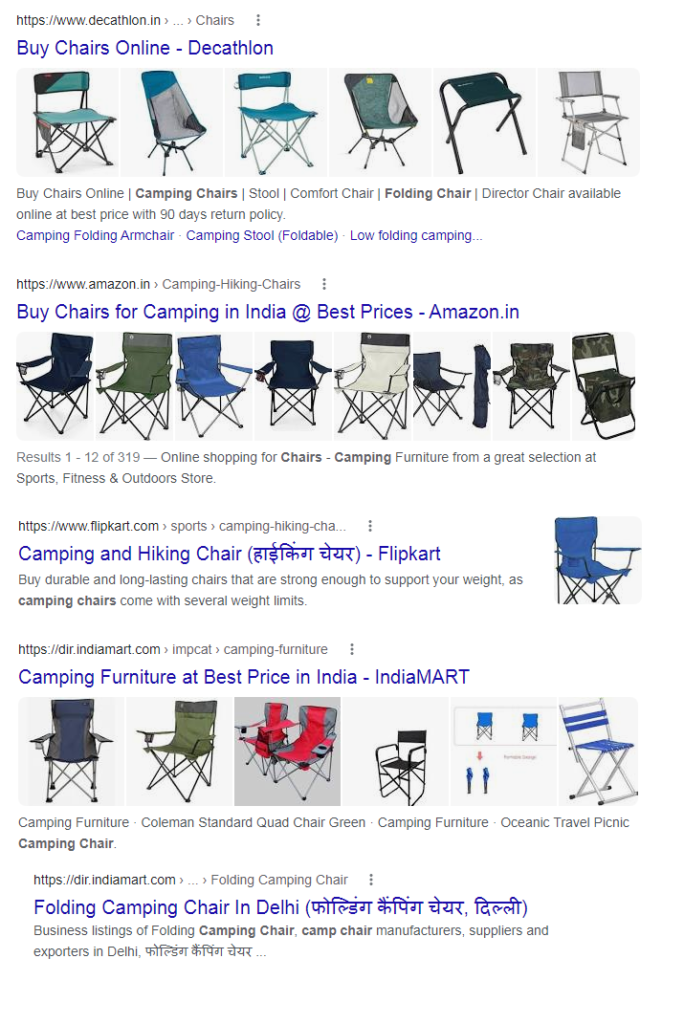
So, we can consider “camping essentials” to be a parent topic, and “what camping gear do I need” could be considered as a sub-topic or more specific topic.
Explore the search intent
You need to study the intention behind the search for each keyword.
Informational queries
When the searcher needs only information and trying to know about something then that query is called an informational query. Most of cases we see blog posts in the search result. For example the case of “camping essentials”, the SERP is full of blog posts giving you detailed and unique information about what essentials you need when you decide to go camping.
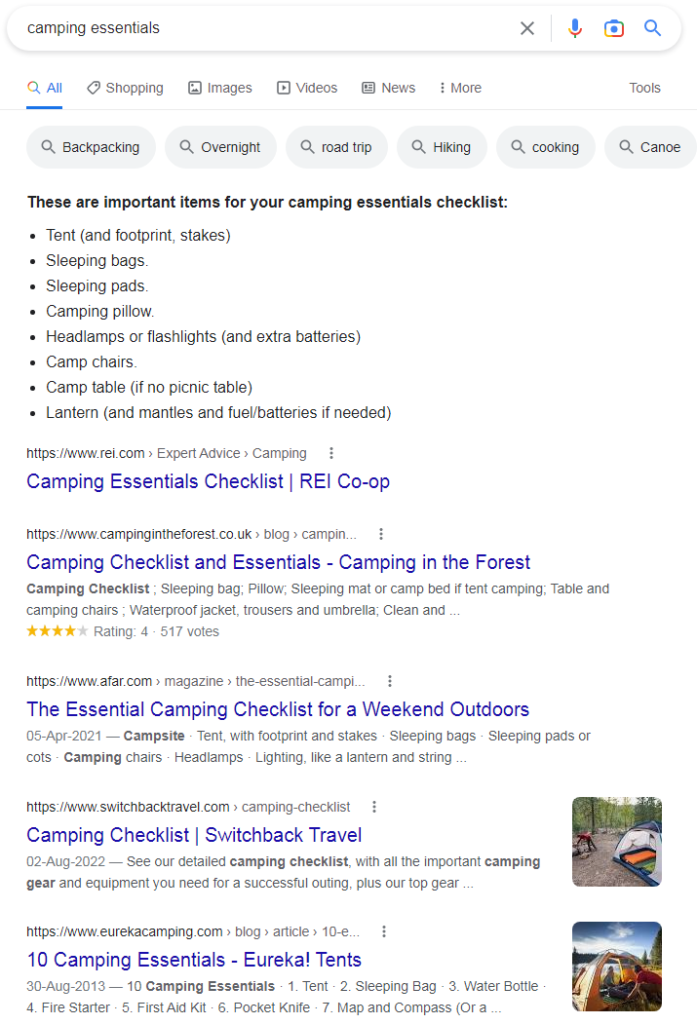
Navigational queries
When the searchers want to go to a particular place on the internet then it’s a Navigational query. For example, if you want to jump straight into the login panel of the Ubersuggest tool page then the SERP gives you exactly where to go.
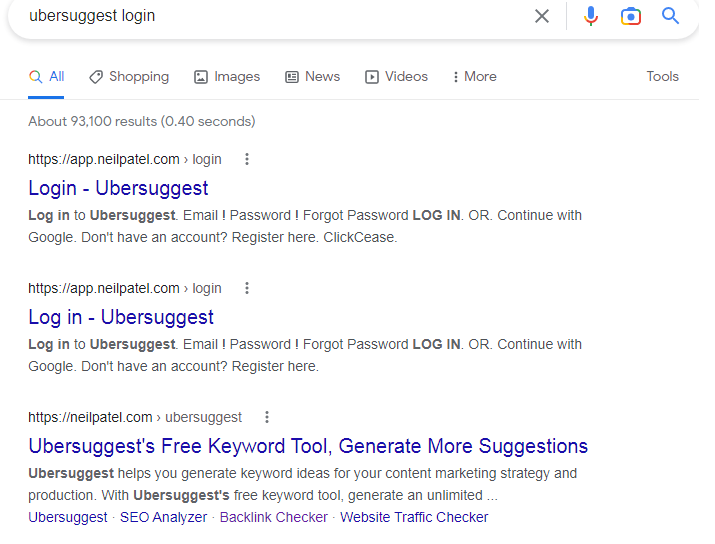
Transactional queries
If the searcher is looking to buy a train ticket or looking for a cheap price store then this is considered a transactional query.
For example, if you try to search “train ticket to Delhi” then it will be a transactional query.
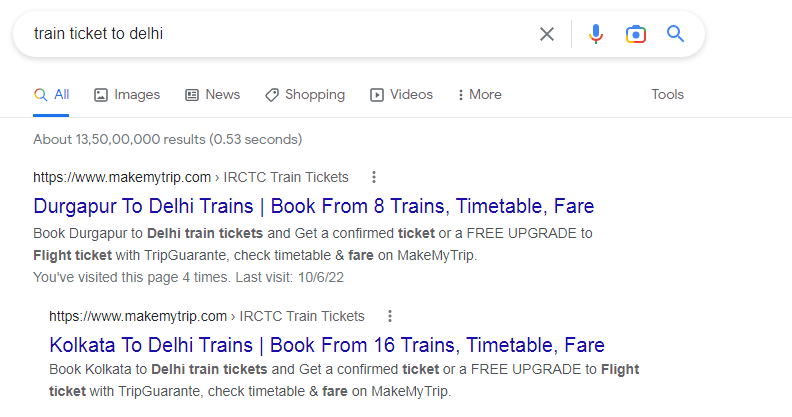
Commercial investigation
Here the searchers are looking for a comparison of products to select the best one as per their needs and requirements.
For example, I want to compare Apple iPhone pro max 14 with the 13 before making a purchasing decision.
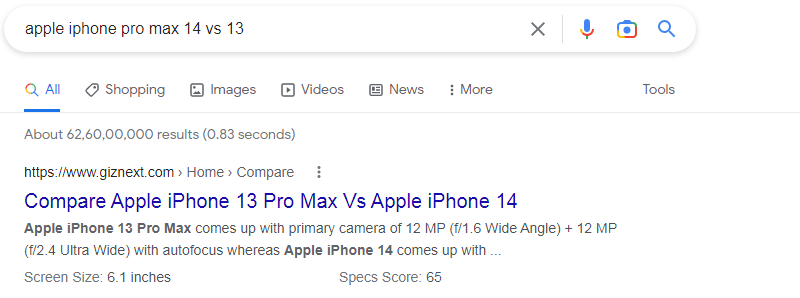
Local queries
The searcher is looking for something locally. For example, if I need to search for restaurants near me then this query would be considered a local query. This kind of search result is often corroborated with Google Maps.
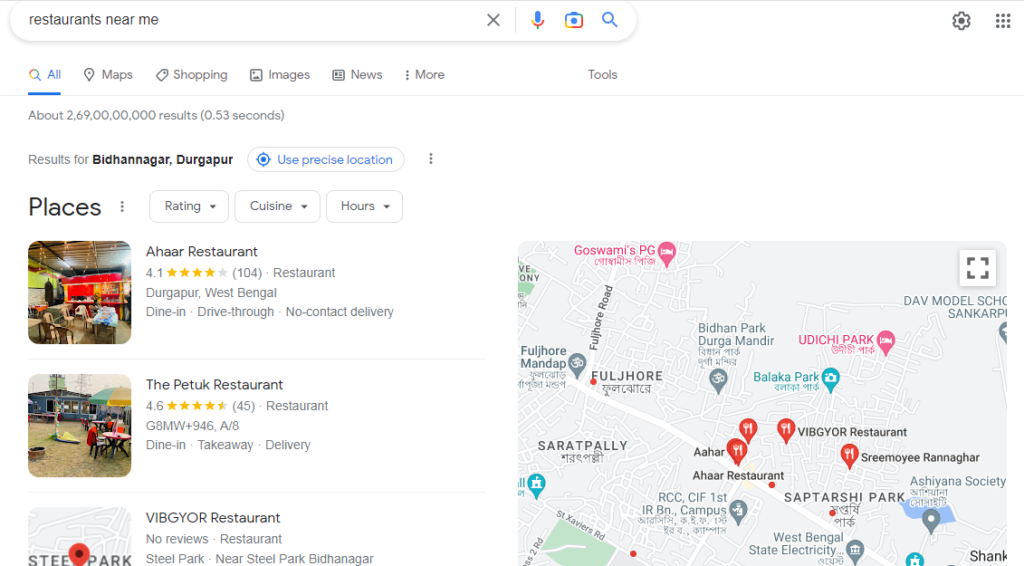
Keywords Prioritization
Now it’s time to decide which keywords you should start working with. Which are the keywords you should be investing your time and money on?
To decide the prioritization of keywords you could follow the below yardstick.
- First, find out the estimated traffic potential of the keyword.
- Second, find out the ranking difficulty of the keyword.
- Third prepare and craft the things that are required to create a rankable page.
- Forth find out the business potential of the keyword.
How to measure the business potential of a keyword
Marketers have created a map of buyers’ journey framework. This is also called a marketing funnel for lead generation. You need to estimate the business value of the keyword by mapping it to this said framework.
The framework has three stages.
- TOFU (Top of the funnel) – This is known as the Awareness stage. Here you have the widest audience and hence the commitment is low. Here you need to provide informational content about any subject or about any solutions to the problems searchers are looking for. For example, if a searcher is looking for “Travel” then he might or might not go for a purchase.
- MOFU (Middle of the funnel) – This is known as the Consideration stage. Here you prepare the content where it serves the research intent of the searchers who are looking for all the available solutions to their problems. Here the commitment is medium. For example, if a searcher is searching for “best airways” then he/she might end up purchasing an air ticket for his/her next trip.
- BOFU (Bottom of the funnel) – This is known as the Conversion stage. Here the searchers’ commitment is high and they are looking forward to take a purchasing decision. Here you have to prepare content where you need to show them the value and sell the “why” and the direct benefits they are going to enjoy. If a searcher is searching the keyword “purchase Air Asia ticket online” then it seems the person is about to buy an air ticket.
Understanding the long tail keyword and these are the ones you should start working with at the start
There is no fixed answer to this. You could start by targeting the seed keywords and relating to keywords to it.
However, if you have a new site then you will be competing against huge companies who are having huge manpower and huge resources. These keywords are usually longer and more specific than seed keywords. For these, you need to keep a balance between a low-difficulty keyword, that has CPC, and has a little bit of search volume and a long tail keyword.
This will help you initially attract traffic organically. After an initial traffic generation, you could move to target your seed keywords.
List of few Keyword research tools
Google Search Console: It is a free web service by Google that helps you to monitor your website’s indexing status, search queries, crawling errors, etc. This will help you to know which keywords your website is ranking for.
Ahrefs Webmaster Tools: This is one of the best SEO tools that I have come across. It handles millions of data across the internet and has a great capability of analyzing your website on different metrics.
Google Keyword Planner: This is a tool for marketers who want to run Ads on their websites. An individual webmaster like many of us could be greatly benefitted from this tool as it provides a storehouse of keyword ideas.
Google Trends: Google Trends is a service by Google that helps you to analyze the popularity of topmost search queries in Google Search across various locations, regions, and languages. It uses graphs to represent the popularity of the keywords.
Ubersuggest: It’s a free and as well as the cheapest keyword research tool in terms of the subscription amount. It is developed by Neil Patel. It is the best tool that you can use as a beginner.
Answer the Public: This is now owned by Neil Patel. It provides all the auto-complete suggestions by Google based on a keyword. You will come to know what people around the world are asking for or looking for.
Moz Keyword Explorer: This tool is developed by MOZ which saves you immense an amount of time to detect that profitable keyword for your business success.
Step-by-step guide to keyword research for your website
- Use any keyword tool to shortlist your keyword.
- Prioritize long-tail keywords.
- Check the important metrics of your keyword like monthly search volume, CPC, and keyword difficulty.
- Check what is the search potential of the keyword.
- Check how your competitors are ranking for the selected keywords.
- Now prepare yourself to create impeccable quality and informative content that exceeds the competitors’ quality for which they are ranking.
FAQs on keyword research
Is keyword research still important?
Yes, keyword research is still very important. It is still pertinent to SEO and search engine rankings. Without the guidance of this research, you could select the wrong keywords for which you could have zero or very little traffic to your website.
What is the purpose of keyword research?
The very purpose of keyword research is to guide you to find out the most profitable keywords that help you to target a specific audience. You can then build your content marketing strategy based on your findings.
What are keyword research tools?
Keyword research tools are essential for any marketing strategy. They provide the insight necessary to understand which words and phrases customers use to search for solutions and products.
With keyword research tools, marketers can identify new opportunities and gain a better understanding of their target audience. Additionally, they allow marketers to measure the performance of existing campaigns and strategies to make well-informed decisions on how to optimize them for greater success.
Can you determine which keywords you should create content for?
Creating content can be a daunting task, especially when trying to determine which keywords you should focus on. To make the process easier, it is important to first understand what content creation entails.
Content creation involves creating and publishing digital content such as blog posts, articles, webpages, and more. Content creation also involves optimizing content for search engine visibility, meaning that you will need to use certain keywords and phrases to ensure your content is seen by the right people.
Is it possible to do keyword research with Google trends?
As businesses continue to explore ways to use search engine optimization (SEO) techniques, keyword research is essential for success in the digital age. One of the best ways to conduct keyword research is with Google Trends, a powerful tool that shows the search volume of a keyphrase or word over time.
Google Trends also provides insights into the regional and seasonal interest in a keyword, helping users understand how their SEO strategies should change over time. Additionally, Google Trends allows users to compare the search volume of two or more terms to get a better sense of the competition in their chosen niche and identify potential opportunities.
Can you do keyword research with free tools?
Yes, you can do keyword research with free tools. However free tools have limitations and it’s always better to go for paid tools. If you are a beginner and just starting to get a grasp of SEO then you should avail free tools.
Can you do keyword research without a tool?
Yes, you can do keyword research without a tool. You can take the help of Google Search Engine and Google Trend to accomplish your task. This method has its limitation. Metrics like search volume, CPC, and difficulty will be almost impossible to detect with this method.
How do I know what keywords to target for my website?
Knowing which keywords to target for your website is a crucial part of optimizing your SEO strategy. To start, you should create a list of relevant terms based on your industry, target audience, and products or services. You can then use keyword research tools like AHREF and Ubersuggest to identify which terms are the most popular and have the highest search volumes. These terms should be targeted first as they have the potential to drive more traffic to your website.
Are there free keyword research tools?
Yes, there are free keyword research tools you can work with. Here are a few lists of the free tools
- Keyword Surfer
- AnswerThePublic
- Keyword Sheeter
- Keyworddit
- QuestionDB
- Ahrefs Keyword Generator
- SEMrush Keyword Magic Tool
- Ubersuggest
- Moz Keyword Explorer
- Soovle
- Keyword Tool Dominator
- Google Trends
Should you do keyword research for paid campaigns?
Keyword research tools are also beneficial for paid campaigns. They allow marketers to gain insight into the target audience and identify potential new customers. With keyword research, marketers can determine which words and phrases they should use when creating ads or campaigns. This allows them to create content that is tailored to their target customers and will be more likely to result in successful conversions.
How does keyword research relate to SEO?
In terms of SEO, keyword research helps marketers to understand which terms are most likely to appear in organic search engine rankings. This allows them to optimize their content, pages, and other SEO elements to appear higher in the search engine rankings and attract more visitors. By understanding which terms customers use to search, marketers can create content tailored to what their audience is looking for, thus allowing them to reach more potential customers.
Read More

